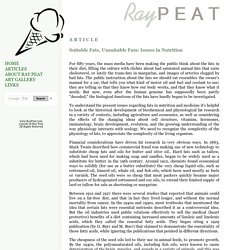

The glycation of proteins is widely believed to be a central process in aging, and is often used to argue that people should reduce their sugar consumption.
Another well publicized problem supposedly involving the reaction between sugars and proteins has to do with the discovery of the carcinogen, acrylamide, in breads and french fries. The Whole Foods Market was sued in California for selling whole wheat bread without a warning that it contained a carcinogen.
But the changes in proteins that occur in diabetes are mainly produced by the breakdown products of polyunsaturated fatty acids. Acrylamide is produced largely by the reaction of PUFA with proteins.
Sugar, by reducing the level of free fatty acids in the body, actually tends to protect against these toxic effects of the PUFA. Diabetes, like cancer, has been known for a long time to be promoted by unsaturated oils in the diet, rather than by sugar. The seed oil industry has been more effective than the sugar industry in lobbying and advertising, and the effects can be seen in the assumptions that shape medical and biological research. -Dr. Peat, Suitable Fats, Unsuitable Fats: Issues in Nutrition.
-PUFA. Role of Altered Venous Blood Lactate and HbA1c in Women with Gestational Diabetes Mellitus. 'Link between diabetes and cancer risk firmly established' HbA1c Cutoff Point of 5.9% Better Identifies High Risk of Progression to Diabetes among Chinese Adults: Results from a Retrospective Cohort Study. Suitable Fats, Unsuitable Fats: Issues in Nutrition.
Suitable Fats, Unsuitable Fats: Issues in Nutrition For fifty years, the mass media have been making the public think about the fats in their diet, filling the culture with clichés about bad saturated animal fats that raise cholesterol, or lately the trans-fats in margarine, and images of arteries clogged by bad fats.

The public instruction about the fats we should eat resembles the owner's manual for a car, that tells you what kind of motor oil and fuel and coolant to use; they are telling us that they know how our body works, and that they know what it needs. But now, even after the human genome has supposedly been partly "decoded," the biological functions of the fats have hardly begun to be investigated.
New information on the use of HbA1c as a compensation criterion.